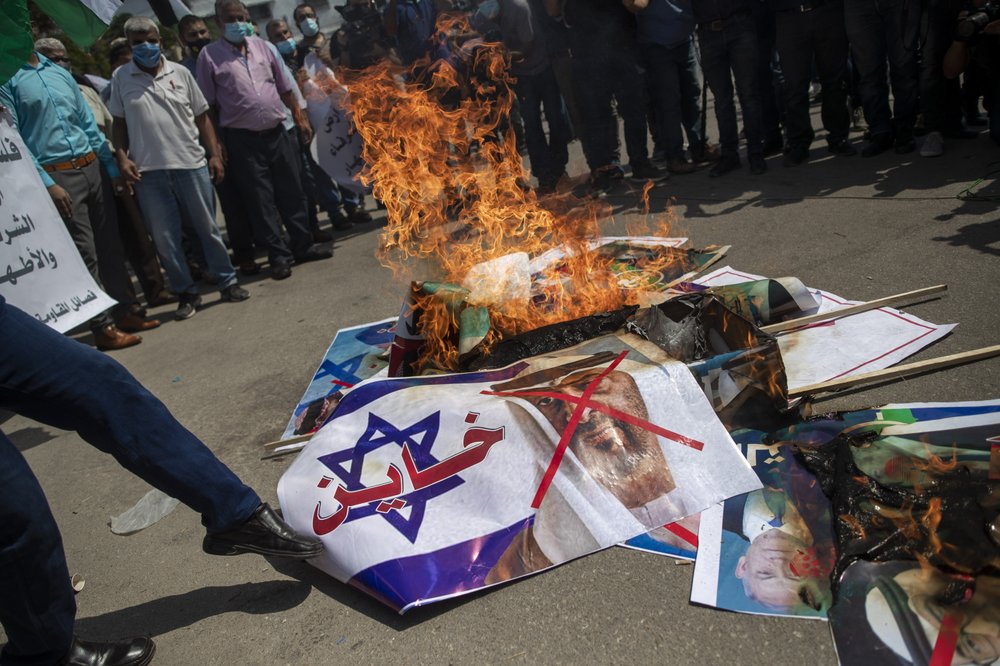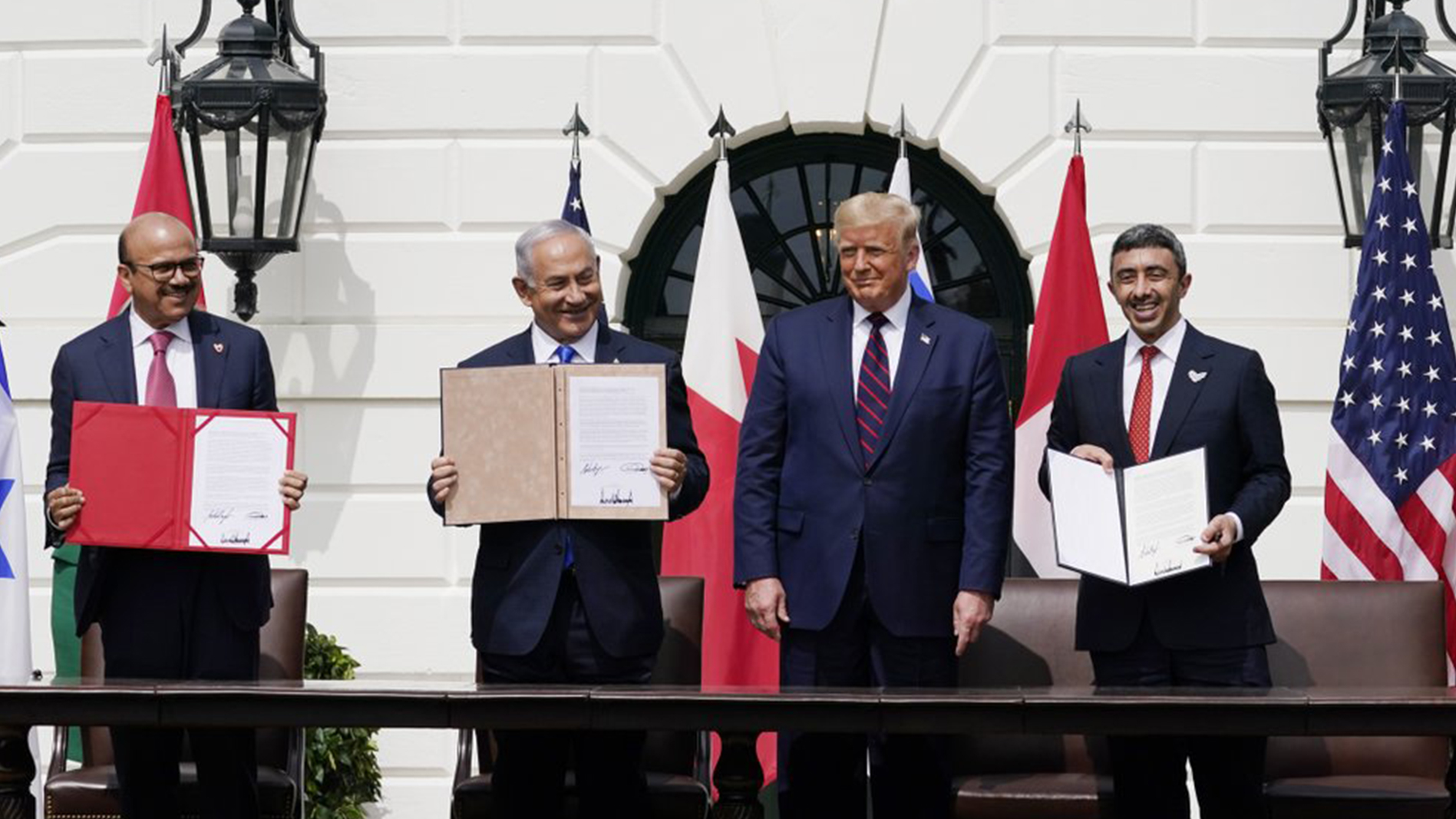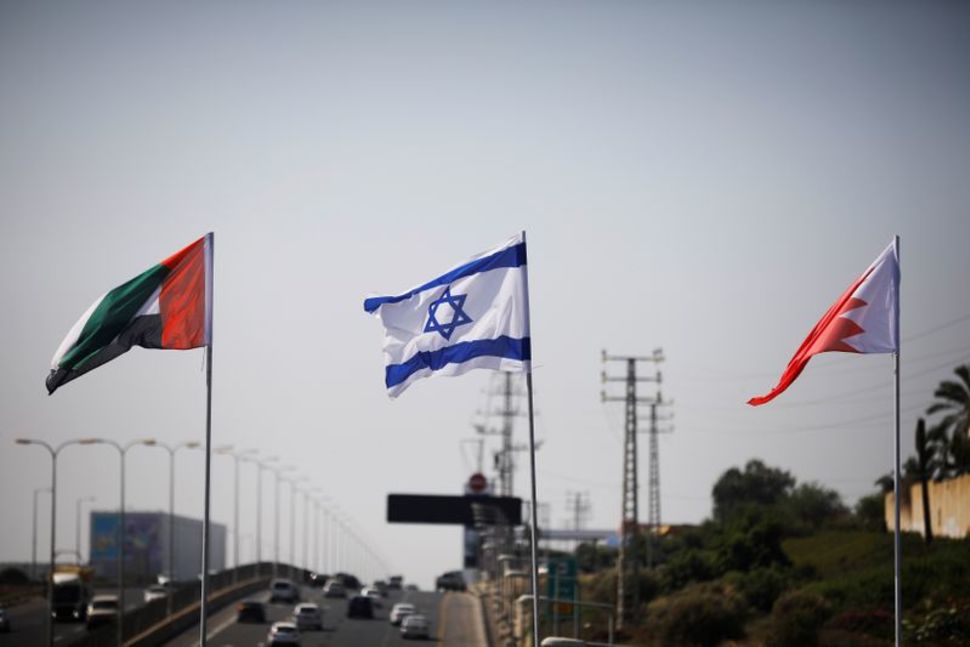
Palestinians burn pictures of U.S. President Donald Trump, Israeli Prime Minister Benjamin Netanyahu, Bahrain's King Hamad bin Isa Al Khalifa and Abu Dhabi Crown Prince Mohammed bin Zayed al-Nahyan, during a protest against the United Arab Emirates and Bahraini normalization agreement with Israel, in Gaza City, September 15, 2020. /AP
Palestinians burn pictures of U.S. President Donald Trump, Israeli Prime Minister Benjamin Netanyahu, Bahrain's King Hamad bin Isa Al Khalifa and Abu Dhabi Crown Prince Mohammed bin Zayed al-Nahyan, during a protest against the United Arab Emirates and Bahraini normalization agreement with Israel, in Gaza City, September 15, 2020. /AP
Palestine on Tuesday said that the signing of the normalization agreements between Israel, the United Arab Emirates (UAE) and Bahrain in Washington will not achieve peace in the Middle East region.
In a press statement, the Palestinian presidency said that the Palestinians will not accept the consequences of the agreements as long as the United States and Israel do not recognize the Palestinian people's right to establish their independent state on the borders of 1967 with East Jerusalem as its capital.
Besides, the Palestinian refugee issue must be resolved under UN Resolution 194, said the statement.
"No one has the right to speak on behalf of the Palestinian people or the Palestine Liberation Organization," the statement added.
"All attempts to bypass the Palestinian people and their leadership will have serious consequences," the statement explained, stressing that the U.S. administration and the Israeli authorities will bear the responsibility.
02:16

Israel signed agreements to normalize diplomatic ties with the UAE and Bahrain at the White House on Tuesday.
U.S. President Donald Trump joined Israeli Prime Minister Benjamin Netanyahu, UAE Foreign Minister Sheikh Abdullah bin Zayed al-Nahyan and Bahraini Foreign Minister Abdullatif bin Rashid Al Zayani in signing the three-way agreements.
The signing ceremony, which was held in the South Lawn at the White House, formally makes the UAE and Bahrain the third and fourth Arab nations to establish diplomatic ties with Israel. Egypt and Jordan signed their peace deals with Israel in 1979 and 1994 respectively.
Meeting Netanyahu earlier in the Oval Office, Trump said, "We'll have at least five or six countries coming along very quickly" to forge their own accords with Israel.
Later Trump told reporters a third Gulf Arab state, Saudi Arabia, would strike an agreement with Israel "at the right time." The Saudi cabinet stressed in a statement the need for a "just and comprehensive solution" to the Palestinian issue.
Trump predicted that Iran, under heavy U.S. sanctions, would want to reach a deal with Washington, which has been trying to get it to renegotiate an international nuclear accord. Tehran shows no sign of budging.

The flags of the United Arab Emirates, Israel and Bahrain flutter along a road in Netanya, Israel, September 14, 2020. /Reuters
The flags of the United Arab Emirates, Israel and Bahrain flutter along a road in Netanya, Israel, September 14, 2020. /Reuters
The UAE and Bahraini officials both sought to reassure the Palestinians that their countries were not abandoning them or their quest for statehood in the West Bank and Gaza Strip, despite the Palestinian leadership having decried the deals as a betrayal of their cause.
In a sign that regional strife is sure to continue while the Israeli-Palestinian conflict remains unresolved, Palestinian militants fired rockets from Gaza into Israel during the ceremony, the Israeli military said.
Israel's Magen David Adom ambulance service said paramedics treated two men for light injuries from flying glass in Ashdod, and four others suffered shock.
"This is not peace, this is surrender in return for the continuation of the aggression," read a tweet posted on the Twitter account of the Palestine Liberation Organization.
(With input from agencies)